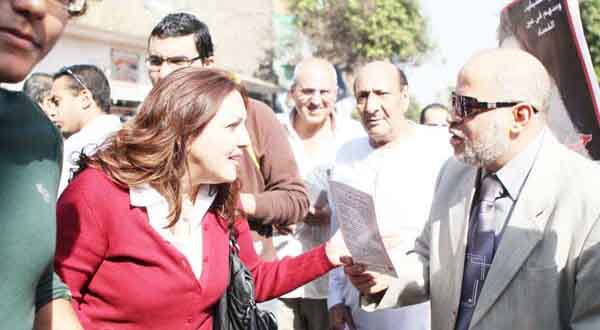 CAIRO: Just like the rest of Cairo, the Qasr El-Nil constituency has been assaulted by election propaganda as of late.
CAIRO: Just like the rest of Cairo, the Qasr El-Nil constituency has been assaulted by election propaganda as of late.
Photographs of incumbent MP Hisham Mostafa Khalil stare out from underneath bridges, the sides of mobile food carts and even from a ladies clothing store — the sign for which has been temporarily replaced with his image and the words “Ma’ak ya Hisham” (We’re with you Hisham). Independent PA elections candidate Gamila Ismail spent Monday trying to convince Qasr El-Nil's Khalil supporters why they shouldn't be.
“What has reminded you of us now?” Om Bassant, a resident of the working class area of Sayeda Zeinab, asked Ismail from inside a tiny alley of crumbling houses accessed by uneven steps. “It’s the elections, isn’t it?”
Ismail responded by asking Om Bassant — the head of the area's National Democratic Party (NDP) women’s committee — why she supports the ruling NDP.
“Because they do things for people,” Om Bassant responded. “What have you done for us? Hisham Mostafa put in water, built the steps, and gives us Ramadan bags [of food each year].”
A man injects himself into the exchange with a string of criticisms against the government. He is promptly removed from the area.
Om Bassant then advised Ismail that she should leave the area before its residents “pelt her with stones.” Ismail refused to do so, prompting a heated exchange between the two women until Om Bassant eventually backed down.
The politician’s composure swiftly returned.
“Om Bassant’s sister called me and said, ‘Me and Om Bassant and everyone, we are with you, but how much will you pay?’” Gamila explained in English to the foreign journalists accompanying her.
“This is how they get all these people,” said Ismail. “They are poor and they can take them to the voting stations with money. I refuse to use the same [methods]. I know [that Om Bassant is] paid to do this. We are going through this battle. We want to tell the people, ‘If you take money for a day, it won’t help you for the next five years.’”
Buying votes is one of the many allegations of election offenses presented against the NDP by opposition parties and observers, spurring many opposition party leaders to call for an election boycott.
Head of the National Association for Change Mohamed ElBaradei has firmly advocated an election boycott, writing in a Twitter message last month, “Detentions and lack of equal opportunities: Those who decided to participate in elections ought to rethink their decision. [The] entire process [is] fake.”
Leading opposition groups like the Muslim Brotherhood — which in the 2005 elections won 88 seats in the People's Assembly (PA) — have rejected a boycott. It is this “lack of consensus” that, according to Ismail, persuaded her to take part in the elections.
“Will a boycott bring about what we are aiming for, which is uncovering the face of this regime?” Ismail asked. “No, it won’t, because we’re not a majority.”
Ismail insisted that having “One, two or 10 free votes in the PA” is important, even though the relatively large number of opposition MPs elected in 2005 have had little effect on the PA's decision-making process.
“It’s true we won’t change anything,” Ismail stated. “Our voting won’t influence anything, but it’s enough that we’re there listening, and bearing witness to events, and conveying them to others so that public opinion knows what is happening.”
Many of the Qasr El-Nil constituents Ismail met on Monday needed very little convincing of her position on the NDP's political bankruptcy. One man, who roared up to the gathering on a motorbike, bellowed eye-wateringly rude insults about MP Khalil.
“Nobody does anything,” the man stated. “These people work for their own interests and come and give people money. Hisham Mostafa doesn’t do anything. He gives café owners LE 2,000, he gives the local thugs money, and that’s it,” he claimed.
What the Qasr El-Nil constituents truly needed to be convinced, however, was that Ismail would make a suitable candidate and that the entire election process itself would be credible.
Amongst the tiny, ramshackle houses in Sherkas — lodged between the Hilton Ramses and the October Bridge — a dispirited man took a break from chopping eggplants on a wood plank balanced on his lap to tell Ismail that fraud is an integral part of the election process in Egypt. He added a suggestion to Ismail that “if you want to win … join the NDP.”
Ismail is taking on the NDP machine as an independent candidate not affiliated with any officially recognized political party. She is also attempting to carve out a distinct political identity for herself independent of any notoriety she might have garnered for her marriage to ex-husband Ayman Nour, the high-profile founder of Al-Ghad Party and 2005 presidential hopeful who was put in prison shortly after the presidential elections concluded.
Ismail told reporters that she has deliberately not applied for the elections as part of the “women’s quota” of 64 female-only PA seats that were introduced into law passed last year. The women’s quota law is a revival of an earlier quota initiative used previously by both former president Anwar Sadat in 1979 and current President Hosni Mubarak in 1984.
The women’s quota, she told reporters, is just another attempt by the NDP to strengthen its political grip.
“Women don’t need a quota,” Ismail said. “The people need a quota. Oppressed people who want to exercise their political rights — they’re the ones who need a quota. The quota was put in place in order to provide extra seats for the NDP majority.
“If you’re not close to the circles of power, you have to fight,” Ismail added. “If you’re close to power and the ruling party, many things are easier. It’s not about whether you’re a man or a woman.”



